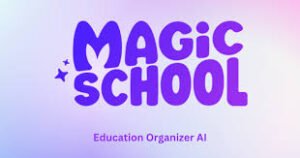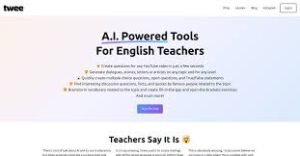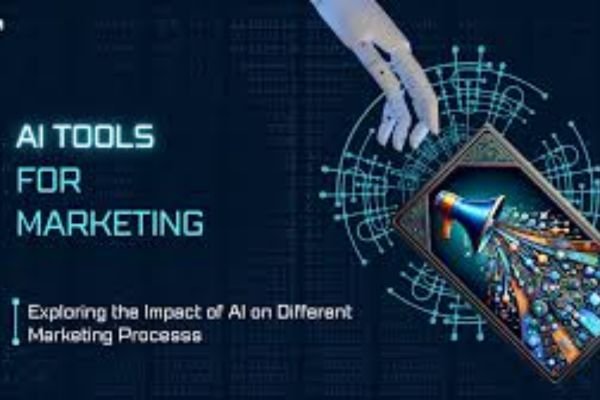The integration of artificial intelligence (AI) into education is transforming how teachers manage their classrooms, deliver lessons, and assess student performance. With the rise of digital learning tools, AI-powered applications are emerging as valuable assets for educators, helping them automate repetitive tasks, personalize instruction, and enhance student engagement. These innovations are not meant to replace teachers but to empower them with data-driven insights and time-saving solutions, allowing them to focus more on meaningful interactions with students.
Teachers today face increasing demands—grading papers, creating lesson plans, tracking student progress, and communicating with parents—all while ensuring that each student receives individualized attention. An AI app designed specifically for educators can alleviate these burdens by automating administrative tasks, generating real-time feedback, and even predicting student learning gaps. By leveraging machine learning and natural language processing, these apps can adapt to different teaching styles and student needs, making education more efficient and inclusive.
As schools worldwide embrace digital transformation, AI apps for teachers are becoming essential tools in modern classrooms. From automated grading systems to AI-generated lesson plans, these applications are reshaping education by providing smarter, faster, and more personalized teaching solutions. This article explores the key features, benefits, challenges, and future potential of AI apps in education, demonstrating how they can enhance both teaching efficiency and student success.
10 Best AI Apps for Teachers in 2025
AI is transforming education by automating tasks, personalizing learning, and enhancing classroom engagement. Here are the top 10 AI apps for teachers in 2025:
1. ChatGPT for Education (by OpenAI)
Description: An AI-powered assistant that helps teachers create lesson plans, generate quizzes, and provide instant answers to student questions.
Key Features:
✔ Lesson plan generation
✔ Instant Q&A support
✔ Essay grading assistance
Link: https://openai.com/chatgpt
2. Gradescope

Description: It uses AI to automate grading for assignments, exams, and coding projects, saving teachers hours of work.
Key Features:
✔ AI-assisted grading
✔ Plagiarism detection
✔ Detailed analytics
Link: https://www.gradescope.com
3. Curipod
Description: An AI-powered lesson creation tool that generates interactive slides, polls, and discussions in seconds.
Key Features:
✔ AI-generated lesson slides
✔ Real-time student engagement tracking
✔ Customizable templates
Link: https://www.curipod.com
4. Diffit
Description: It helps teachers adapt reading materials to different grade levels using AI, making content accessible for all students.
Key Features:
✔ Text level adjustment
✔ Vocabulary support
✔ Comprehension questions
Link: https://www.diffit.me
5. MagicSchool AI

Description: An all-in-one AI assistant for teachers, offering tools for lesson planning, rubric creation, and IEP (Individualized Education Program) support.
Key Features:
✔ Custom lesson plan generator
✔ Behavior intervention suggestions
✔ Student feedback automation
Link: https://www.magicschool.ai
6. Eduaide.AI
Description: It provides AI-generated teaching resources, including worksheets, discussion prompts, and project ideas.
Key Features:
✔ Worksheet & activity generator
✔ Multi-language support
✔ Standards-aligned content
Link: https://www.eduaide.ai
7. Brisk Teaching
Description: A Chrome extension that helps teachers create quizzes, give feedback, and detect AI-written student work.
Key Features:
✔ AI writing detection
✔ Google Docs/Classroom integration
✔ Instant feedback generator
Link: https://www.briskteaching.com
8. QuestionWell
Description: Generates high-quality multiple-choice questions from any text, saving teachers time on quiz creation.
Key Features:
✔ Auto-question generation
✔ Export to Google Forms & Quizlet
✔ Bloom’s Taxonomy alignment
Link: https://www.questionwell.org
9. Twee

Description: An AI tool specifically for English teachers, helping with reading passages, vocabulary exercises, and speaking activities.
Key Features:
✔ Reading comprehension generator
✔ Debate & discussion prompts
✔ YouTube video-based exercises
Link: https://twee.com
10. Fetchy
Description: A virtual assistant for teachers that handles administrative tasks, parent communication, and lesson ideas.
Key Features:
✔ Email & newsletter drafting
✔ Meeting agenda generator
✔ Personalized teaching strategies
Link: https://www.fetchy.com
Key Features of the AI App for Teachers
Automated Grading & Feedback
One of the most time-consuming tasks for teachers is grading assignments and exams. An AI app can streamline this process by automatically evaluating multiple-choice tests, short answers, and even essays using natural language processing. Teachers can set grading criteria, and the AI will provide instant scores along with personalized feedback for each student. This not only reduces workload but also ensures consistent and unbiased evaluations. Additionally, AI can track common mistakes across the class, helping teachers identify areas where students struggle the most.
Personalized Learning Assistance
Every student learns at a different pace, and an AI app can help teachers tailor instruction to individual needs. By analyzing student performance data, the AI can recommend customized learning paths, suggest additional resources, and even generate adaptive quizzes that adjust difficulty based on the learner’s progress. For example, if a student is struggling with algebra, the app might provide extra practice problems or video tutorials. This level of personalization ensures that no student is left behind while advanced learners remain challenged.
Lesson Planning & Content Generation
Creating engaging lesson plans can be a daunting task, especially when teachers have limited time. AI-powered apps can assist by generating structured lesson plans based on curriculum standards, complete with suggested activities, multimedia resources, and discussion prompts. Some apps even use AI to create slideshows, worksheets, and interactive exercises in seconds. This feature allows teachers to focus more on delivering high-quality instruction rather than spending hours on preparation.
Student Engagement & Classroom Management
Keeping students engaged is a constant challenge, but AI can help by introducing interactive elements such as gamified quizzes, virtual rewards, and real-time participation tracking. The app can monitor student activity during lessons, flagging those who seem disengaged or distracted. Teachers can then intervene with targeted questions or alternative teaching methods to re-engage them. AI can also assist with behavior management by analyzing patterns and suggesting strategies to maintain a positive classroom environment.
Communication & Parent Engagement
Maintaining clear communication with parents is crucial for student success. An AI app can automate progress reports, sending regular updates on grades, attendance, and behavior. AI chatbots can handle common parent inquiries, such as assignment deadlines or school events, freeing up teachers’ time. Additionally, the app can send automated reminders for parent-teacher conferences or important deadlines, ensuring that parents stay informed and involved in their child’s education.
Benefits of Using an AI App for Teachers
Time-Saving & Efficiency
Teachers spend countless hours on administrative tasks that could be automated. An AI app can handle grading, attendance tracking, and report generation, allowing educators to dedicate more time to actual teaching. By reducing manual workloads, teachers can focus on creative lesson delivery and one-on-one student support, ultimately improving the quality of education.
Enhanced Student Performance
Personalized learning is one of the most significant advantages of AI in education. By tailoring lessons to individual student needs, AI helps bridge learning gaps and accelerates progress. Early intervention becomes easier when the app identifies struggling students and suggests remedial actions. Over time, this leads to better academic outcomes and higher student confidence.
Data-Driven Decision Making
AI apps collect and analyze vast amounts of data on student performance, providing teachers with actionable insights. Educators can see which topics students grasp quickly and which require more attention, allowing them to adjust their teaching strategies accordingly. This data-driven approach ensures that instruction is always aligned with student needs.
Accessibility & Inclusivity
AI can support diverse learners, including those with disabilities or who are non-native language speakers. Features like speech-to-text, translation tools, and adaptive learning interfaces make education more accessible. For special education students, AI can recommend customized resources and modifications, ensuring that every learner has an equal opportunity to succeed.
Potential Challenges & Solutions
Privacy & Data Security Concerns
With AI handling sensitive student data, privacy is a major concern. Schools must ensure that the app complies with regulations like GDPR or FERPA. Implementing strong encryption, anonymizing data, and allowing strict access controls can mitigate risks. Teachers and administrators should also be trained on data security best practices.
Teacher Adaptation & Training
Not all educators are tech-savvy, and some may resist adopting AI tools. To overcome this, schools should provide comprehensive training sessions and ongoing support. Demonstrating real-world benefits—such as time saved and improved student outcomes—can encourage reluctant teachers to embrace the technology.
Cost & Accessibility Issues
While AI apps can be highly beneficial, budget constraints may limit access for some schools. Developers can offer freemium models with basic features for free, while premium versions include advanced tools. Governments and educational institutions should also consider funding initiatives to ensure equitable access to AI-powered education tools.
Case Studies & Real-World Examples
Several AI applications are already making waves in education. Gradescope, for instance, uses AI to streamline grading for handwritten assignments, saving teachers hours of work. ChatGPT for Teachers helps generate lesson plans, quizzes, and even email templates. Schools using these tools report higher efficiency and improved student engagement. Teacher testimonials highlight how AI reduces burnout and allows more meaningful classroom interactions.
The Future of AI in Teaching
The integration of artificial intelligence (AI) into education is still in its early stages, but the potential for transformation is immense. As technology evolves, AI is expected to revolutionize teaching in once unimaginable ways—from hyper-personalized learning experiences to predictive analytics that can identify struggling students before they fall behind. However, with these advancements come important ethical questions that must be carefully considered to ensure AI enhances rather than disrupts the educational landscape.
Emerging Trends in AI-Powered Education
- Voice-Activated Teaching Assistants
- AI-powered voice assistants (similar to Alexa or Siri but designed for classrooms) could soon become a standard tool for teachers.
- These assistants could answer student questions in real time, provide instant translations for multilingual classrooms, and even read aloud text for students with disabilities.
- In the future, voice AI might even analyze student tone and speech patterns to detect confusion or disengagement, alerting teachers to intervene.
- Virtual and Augmented Reality (VR/AR) Classrooms
- AI-driven VR could simulate immersive learning environments—such as historical events, scientific experiments, or virtual field trips—without leaving the classroom.
- AR overlays could provide real-time annotations during lessons, helping visual learners grasp complex concepts.
- Adaptive VR lessons could adjust difficulty based on student performance, ensuring an optimal challenge level.
- Predictive Analytics for Student Success
- AI algorithms are becoming increasingly sophisticated at analyzing student data to predict academic risks.
- Schools could use these insights to identify students at risk of dropping out, allowing for early intervention with tutoring or counseling.
- AI might also recommend career paths based on a student’s strengths, interests, and past performance.
- AI Tutors and 24/7 Learning Support
- Advanced AI chatbots could act as personal tutors, providing homework help outside school hours.
- These tutors could adapt explanations based on a student’s learning style—switching between visual, auditory, or interactive methods as needed.
- In the future, AI might even simulate human-like tutoring sessions using natural language processing and emotional recognition.
- Automated Curriculum Design & Real-Time Adjustments
- AI could analyze global education trends and adjust school curricula to better prepare students for future job markets.
- During lessons, AI might suggest alternative teaching methods if it detects that students aren’t grasping a concept.
- Dynamic AI-generated textbooks could update in real time with the latest research, eliminating outdated information.
Ethical Challenges and Considerations
While AI holds incredible promise, its rapid adoption in education raises several ethical concerns:
- Bias in AI Algorithms
- If AI systems are trained on biased data, they may reinforce existing inequalities (e.g., favoring certain demographics over others).
- Developers must ensure diverse datasets and continuous auditing to prevent discriminatory outcomes in grading or student recommendations.
- Over-Reliance on Automation
- There’s a risk that schools might depend too heavily on AI, reducing human interaction in learning.
- Teachers must remain central to education, using AI as a tool rather than a replacement.
- Data Privacy and Security
- Equity and Accessibility
- Not all schools can afford advanced AI tools, potentially widening the gap between well-funded and under-resourced institutions.
- Policymakers and tech companies must work together to ensure equitable access to AI-powered education.
The Path Forward: Responsible AI Integration
For AI to reach its full potential in education, a balanced approach is necessary. Schools should:
- Invest in teacher training so educators can effectively use AI tools without losing their personal teaching touch.
- Prioritize transparency—students, parents, and teachers should understand how AI makes decisions.
- Encourage collaboration between developers and educators to ensure AI tools are pedagogically sound
Conclusion
AI apps for teachers are revolutionizing education by automating routine tasks, personalizing learning, and providing data-driven insights. These tools empower educators to focus on what truly matters—inspiring and guiding their students. While challenges like data security and adoption barriers exist, the benefits far outweigh the drawbacks, making AI an indispensable ally in modern classrooms.
As technology continues to evolve, AI will play an even greater role in shaping the future of education. Teachers who embrace these tools will find themselves better equipped to meet the diverse needs of their students, fostering a more engaging and effective learning environment. The key lies in balancing innovation with ethical considerations, ensuring that AI enhances—rather than replaces—the human touch in teaching.
Ultimately, the goal of AI in education is not to take over the role of teachers but to amplify their impact. By leveraging smart technology, educators can create more inclusive, efficient, and inspiring classrooms, preparing students for success in an increasingly digital world






